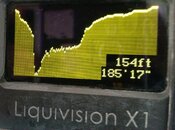Thank you for your thoughts.
1. Absolutely and heartily agree!
2. That's certainly viable, at the time I was concerned with making it to shore, to avoid being a bobbing beacon floating to Cuba, but clearing the deco ceiling felt good. Avoiding the struggle and task load by waiting it out with adequate gas (see point 1) would have been ideal.
3. I only had straight air (reg no lp inflator) and the o2 rebreather (hardplumbed no connections) as bailouts.
I'm considering 4/5 and like the overlooked possibility. Thank you. I did metabolize a lot of o2, hence my shortage, stands to math and reason that my scrubber is absorbing the co2 plus all the scr time, perhaps I need to rethink my hypoxic theory on my blackout. The breath holding while swapping breathers (both to the failed breather and back again on the loop) plus coughing certainly elevated my co2 levels, perhaps I did breakthrough or at least overwhelmed the scrubber. I was using sodasorb 4/8 in a prism topaz (radial 6lb scrubber). I didn't feel the need to hyperventilate like breathing a bypassed or exhausted scrubber, perhaps it was only partial but enough to explain my euphoria.
Thank you again,
Cameron
P.s. Friendly critique is welcome while I do appreciate the non critical attitudes. It's showing me the value of talking about our mistakes/troubles/mishaps.
1. Absolutely and heartily agree!
2. That's certainly viable, at the time I was concerned with making it to shore, to avoid being a bobbing beacon floating to Cuba, but clearing the deco ceiling felt good. Avoiding the struggle and task load by waiting it out with adequate gas (see point 1) would have been ideal.
3. I only had straight air (reg no lp inflator) and the o2 rebreather (hardplumbed no connections) as bailouts.
I'm considering 4/5 and like the overlooked possibility. Thank you. I did metabolize a lot of o2, hence my shortage, stands to math and reason that my scrubber is absorbing the co2 plus all the scr time, perhaps I need to rethink my hypoxic theory on my blackout. The breath holding while swapping breathers (both to the failed breather and back again on the loop) plus coughing certainly elevated my co2 levels, perhaps I did breakthrough or at least overwhelmed the scrubber. I was using sodasorb 4/8 in a prism topaz (radial 6lb scrubber). I didn't feel the need to hyperventilate like breathing a bypassed or exhausted scrubber, perhaps it was only partial but enough to explain my euphoria.
Thank you again,
Cameron
P.s. Friendly critique is welcome while I do appreciate the non critical attitudes. It's showing me the value of talking about our mistakes/troubles/mishaps.




